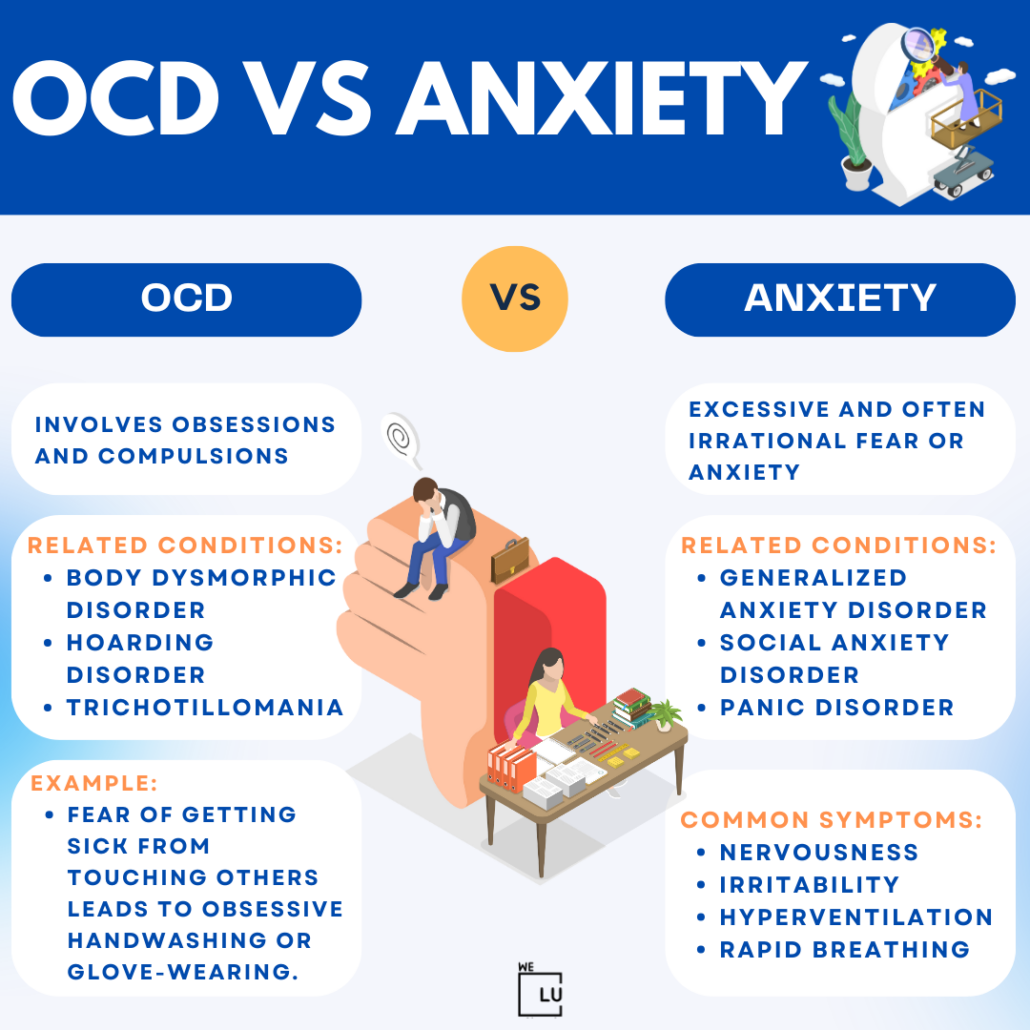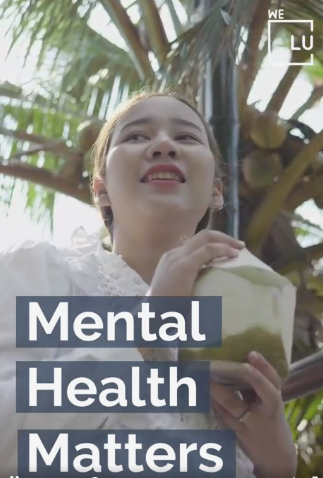We Level Up FL Mental Health Center Tips To Cope With OCD
✅ Identify Triggers: Recognize the situations, thoughts, or environments that trigger your obsessions and compulsions. Understanding your triggers can be the first step in managing them.
✅ Practice Mindfulness: Incorporate mindfulness techniques into your daily routine to help you stay present and reduce the power of intrusive thoughts. Mindfulness can be a valuable tool in managing OCD symptoms.
✅ Seek Professional Help: Connect with a mental health professional experienced in OCD treatment. Evidence-based therapies like Cognitive-Behavioral Therapy (CBT) and Exposure Response Prevention (ERP) can be highly effective in managing OCD.
✅ Build a Support System: Share your challenges with trusted friends and family who can offer support and understanding. Building a strong support system can help you feel less isolated in your journey toward managing OCD.

How to Tell if You Have Anxiety or OCD
It can be hard to tell the difference between worry and OCD (Obsessive-Compulsive Disorder) since the two may have some things in common. But being aware of the differences can help you figure out what illness is hurting you. When trying to figure out if you have anxiety or OCD, here are some essential things to keep in mind:
- Nature of Worries:
- Anxiety: Anxiety often involves generalized worry about various aspects of life, such as health, work, relationships, or future uncertainties. These worries may be excessive, persistent, and disproportionate to the actual threat.
- OCD: OCD is characterized by specific, intrusive, and distressing thoughts known as obsessions. These obsessions trigger intense anxiety and lead to compulsive behaviors or mental rituals aimed at alleviating that anxiety.
- Compulsive Behaviors:
- Anxiety: Individuals with anxiety may seek to avoid situations that trigger their anxiety or engage in safety behaviors like reassurance-seeking or avoiding certain places or people.
- OCD: Compulsive behaviors, such as repeated handwashing, counting, checking, or organizing, are a hallmark of OCD. These rituals are performed in response to obsessions and are meant to reduce distress.
- Impact on Daily Life:
- Anxiety: While anxiety can be distressing and disruptive, it does not necessarily lead to the same level of interference in daily life as OCD.
- OCD: OCD often significantly impairs daily functioning as individuals spend a considerable amount of time and effort performing compulsions.

End the Emotional Pain. Get Your Life Back.
Feeling Depressed, Anxious or Struggling with Mental Health Illness? Get Safe Comfortable Mental Health Dual Diagnosis High-Quality Therapy From Counselors That Care. Begin Your Recovery Now.
Hotline (855) 940-6125Treatment For OCD And Anxiety
The International OCD Foundation says that the best ways to treat OCD are through cognitive behavioral therapy (CBT) and medicine. Exposure and reaction prevention (ERP) therapy is a type of cognitive behavioral therapy.
A 2019 study says that ERP is the best way to treat OCD. The writers say that up to half of people with ERP will notice a big difference in their symptoms, whether they take medicine alone or with it. However, it doesn’t work for everyone.
When someone is in ERP, they work with a mental health professional to talk about their compulsions, the fears or anxieties that might be causing them, and how the two connect. Someone may also say they fear what will happen if they don’t do their excessive habits.
Then, someone will put different situations in order from least stressed to most stressful. Then, when similar problems arise, they will try to stop doing their routines or obsessive behaviors with the therapist’s help. These things can be done in real life and by planning them in your mind.
The goal of ERP is to teach a person that giving up the things or activities that bother them and not doing their repetitive behaviors won’t have the bad results they fear.
Best Medication For Anxiety And OCD
Certain psychiatric medications can help control the obsessions and compulsions of OCD. Most commonly, antidepressants are tried first.
Antidepressants approved by the U.S. Food and Drug Administration (FDA) to treat OCD include:
- Clomipramine (Anafranil) for adults and children ten years and older.
- Fluoxetine (Prozac) for adults and children seven years and older.
- Fluvoxamine for adults and children eight years and older.
- Paroxetine (Paxil, Pexeva) for adults only.
- Sertraline (Zoloft) for adults and children six years and older.

First-class Facilities & Amenities
World-class High-Quality Mental Health Services & Behavioral Health Substance Abuse Treatment
Rehab Centers TourRenowned Mental Health Centers. Serene Private Facilities. Inpatient Rehab Programs Vary.
Mental Health Helpline (855) 940-6125Proven recovery success experience, backed by a Team w/ History of:
15+
Years of Unified Experience
100s
5-Star Reviews Across Our Centers
10K
Recovery Successes
- Comprehensive Dual-Diagnosis Treatment
- Complimentary Family & Alumni Programs
- Coaching, Recovery & Development Events
- Comfortable Onsite Medical Detox Center
We Level Up FL Dual Diagnosis Treatment
Different institutions may use the word “dual diagnosis,” sometimes called “co-occurring disorders,” in slightly different ways. In general, it refers to how people who have been diagnosed with both a substance use problem and a mental health disorder are treated.
Dealing with people who have more than one diagnosis is an integral part of our inpatient treatment approach. This is because having more than one condition at the same time is closely linked to drug abuse. For clients to be on the road to recovery, a good treatment plan includes the physical aspects of detox, the psychological aspects of drug use, and the management of any underlying mental health conditions.
A complete mental health evaluation is an essential first step in finding treatment options. Working together with mental health counselors and doctors gives people access to behavioral therapy and medication-based treatments that are specifically designed for their needs.
We Level Up is dedicated to providing the best care at our dual illness treatment center. We know that mental health problems and drug abuse problems can affect each other in complicated ways, which can sometimes keep people addicted. We offer specialized care for people with two or more diagnoses, giving them the best chance for healing and long-term recovery.
It can be hard to admit that you might be living with a mental illness, but once it is properly diagnosed and treated, dealing with the problem of drug abuse at the same time becomes a lot easier. It is important to remember that these underlying conditions can only be diagnosed by trained medical workers. If you think you may be dealing with both an addiction and a mental health problem, you should get help from a reputable facility right away to start your recovery. To take that essential first step, contact We Level Up right now.
World-class, Accredited, 5-Star Reviewed, Effective Mental Health Dual Diagnosis Programs. Complete Integrated Inpatient Rehab with Free Post Discharge Therapy Planning.
CALL (855) 940-6125End the Emotional Pain Rollercoaster. Gain Stability & Happiness Through Recovery Treatment. Start Mental Health Counseling Today. Get Free No-obligation Guidance by Behaviroal Health Specialists Who Understand Mental Health Recovery.
Anxiety and OCD FAQs
-
Is OCD A Form Of Anxiety?
Obsessive-Compulsive Disorder, OCD, is an anxiety disorder and is characterized by recurrent, unwanted thoughts (obsessions) and repetitive behaviors (compulsions).
-
Can Anxiety Cause OCD?
Recognizing the emotion that triggers worsened obsessions or compulsions is the first step in treating OCD. An individual can learn to detect when they are nervous and employ coping mechanisms for the anxiety, as anxiety can quickly result in an OCD episode.
-
Can You Develop OCD From Anxiety?
According to Dr. Allende, the first stage in treating OCD is to identify the emotion that triggers obsessive or compulsive behaviors that get worse. An individual can learn to recognize when they are nervous and employ coping mechanisms for the anxiety as anxiety can quickly progress to an OCD episode.
-
Why Was OCD Removed From Anxiety Disorders?
OCD was reclassified by the American Psychiatric Association as a distinct illness in 2013. This is because each of these illnesses has distinctive abnormalities in the chemistry and function of the brain. There are some commonalities between OCD and anxiety treatments. However, there may also be significant differences or inconsistencies.
-
Does OCD Cause Anxiety?
Obsessions with OCD are intrusive, recurrent, unwelcome thoughts, desires, or visions that are distressing or anxious.
Tips on Coping With Your Anxiety
Search We Level Up FL Is OCD An Anxiety Disorder? Learn if You Have OCD or Anxiety Resources
Sources
- Deep brain stimulation for obsessive compulsive disorder: Evolution of surgical stimulation target parallels changing model of dysfunctional brain circuits. Frontiers in Neuroscience. 2019; doi:10.3389/fnins.2018.00998. Is OCD An Anxiety Disorder Related Articles
- Obsessive-compulsive disorder. In: Diagnostic and Statistical Manual of Mental Disorders DSM-5. 5th ed. American Psychiatric Association; 2013. https://dsm.psychiatryonline.org. Is OCD An Anxiety Disorder Related Articles
- Suicidality in children and adolescents being treated with antidepressant medications. U.S. Food and Drug Administration. https://www.fda.gov/drugs/postmarket-drug-safety-information-patients-and-providers/suicidality-children-and-adolescents-being-treated-antidepressant-medications. Is OCD An Anxiety Disorder Related Articles
- Gabriel M, et al. Antidepressant discontinuation syndrome. Canadian Medical Association Journal. 2017; doi:10.1503/cmaj.160991. Is OCD An Anxiety Disorder Related Articles
- Zai G, et al. New insights and perspectives on genetics of obsessive-compulsive disorder. Psychiatric Genetics. 2019; doi:10.1097/YPG.0000000000000230. Is OCD An Anxiety Disorder Related Articles
- Obsessive-compulsive disorder. National Alliance on Mental Illness. https://www.nami.org/Learn-More/Mental-Health-Conditions/Obsessive-compulsive-Disorder/Overview. Is OCD An Anxiety Disorder Related Articles
- Obsessive-compulsive disorder in children and adolescents. American Academy of Child & Adolescent Psychiatry. https://www.aacap.org/AACAP/Families_and_Youth/Facts_for_Families/FFF-Guide/Obsessive-Compulsive-Disorder-In-Children-And-Adolescents-060.aspx. Is OCD An Anxiety Disorder Related Articles
- Obsessive-compulsive disorder. National Institute of Mental Health. https://www.nimh.nih.gov/health/topics/obsessive-compulsive-disorder-ocd/index.shtml. Is OCD An Anxiety Disorder Related Articles
- Mental health medications. National Institute of Mental Health. https://www.nimh.nih.gov/health/topics/mental-health-medications/index.shtml#part_149856. Is OCD An Anxiety Disorder Related Articles





